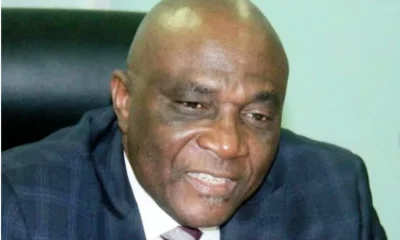Headline
Reuters: Baba Go-fast? Nigeria’s Tinubu Stuns Wary Investors With Quick Reforms

Nigeria’s new president, in office for less than a month, is pushing to put Africa’s largest economy on a reform track that investors have eyed for decades, fuelling excitement that money could flow to a nation that many had deemed uninvestible.
President Bola Tinubu’s bold actions, including removing restrictions on the naira currency that allowed it to hit a record 790 to the dollar and subsidy removals that tripled petrol prices, could take stress off the battered finances of Africa’s largest economy.
But investors, burned by previous reforms that ultimately proved hollow, say it will take time to build trust and listed myriad questions over the final shape of the economy.
“The reaction is one of, ‘finally’,” said Tunde Ajileye, a partner at Lagos-based SBM Intelligence. “If this stays, then it would mean that (Tinubu) had been able to remove the two subsidies that have crippled Nigeria fiscally and monetarily for the last decade.”
Tinubu is from the same party as predecessor Muhammadu Buhari, dubbed “Baba Go-slow” for his pottering pace – taking six months to appoint cabinet members.
By contrast, Tinubu lifted fuel price caps days after taking office on May 29, suspended controversial Central Bank chief Godwin Emefiele some 10 days later and on Wednesday removed FX restrictions.
The tangle of multiple exchange rates for everything from international school fees to food imports created foreign currency shortages and hobbled investment due to issues getting money out.
“Just the fact that you have seen quite a bit of movement in a relatively short space of time has gotten a lot of people in the market excited,” said Goldman Sachs economist Andrew Matheny.
Nigeria’s international dollar bonds and the country’s stock market have been boosted by the speedy reforms.
BACKLOG, AND BURNED BEFORE
Investors, though, remained wary, citing years of damaging currency controls; Goldman Sachs pegged the backlog of FX demand at a staggering $12 billion.
“We are still to see whether this will allow the FX backlog to clear, where the new market rate will stabilise, whether this will catalyse inflows into the country and … that there will be no issues pulling money out of the country,” said John Mumo, a partner at Blakeney, an Africa-focused equities fund management firm.
Joe Delvaux, a portfolio manager at Europe’s largest asset manager Amundi, said it could take months or more to lure longer-term cash.
“Ultimately, you also have to keep in mind that the biggest provider of FX will still be the CBN,” Delvaux said.
“We need to see that the system works.”
Tinubu will also have to tackle the perennial corruption that has hobbled the country for decades. Nigeria is ranked 150 out of 180 in Transparency International’s 2022 corruption perceptions index – and has been on a downward trend since 2016.
Investors also worry about low tax receipts and falling oil output – structural reforms that will take far longer to sort.
Some are also hoping to see a more orthodox interest rate policy. Inflation hit a near 20-year high of 22.41% in May and a weakening naira will amplify price pressures. Meanwhile interest rates, which Tinubu has said he would like to see fall, were hiked by 50 bps last month to 18.5%.
“Investors will need to see positive real rates and evidence that they will be able to repatriate their earnings before local currency debt is back in play,” said Patrick Curran, senior economist at Tellimer.
Headline
Fagbemi warns against obstructing EFCC from performing its lawful duty

The Minister of Justice, Lateef Fagbemi, SAN has warned against obstructing the Economic and Financial Crimes Commission (EFCC) from carrying out its lawful duty .
Fagbemi’s warning is contained in a statement in Abuja.
“This is a matter of very grave concern, it is now beyond doubt that the EFCC is given power by the law to invite any person of interest to interact with them in the course of their investigations into any matter, regardless of status.
“Therefore, the least that we can all do when invited, is not to put any obstruction in the way of EFCC, but to honourably answer their invitation.
“A situation where public officials who are themselves subject of protection by law enforcement agents will set up a stratagem of obstruction to the civil and commendable efforts of the EFCC to perform its duty is to say the least, insufferably disquieting’’.
He added that running away from the law will not resolve issues at stake but only exacerbate them.
“Nigeria has a vibrant judicial system that is capable of protecting everyone who follows the rule of law in seeking protection.
“I therefore encourage anyone who has been invited by the EFCC or any other agency to immediately toe the path of decency and civility by honouring such invitation instead of embarking on a temporising self-help and escapism.
“This can only put our country in bad light before the rest of the world’’.
He said institutions of state should be allowed to function effectively and efficiently.
“I stand for the rule of law and will promptly call EFCC, and indeed any other agency to order when there is an indication of any transgressions of the fundamental rights of any Nigerian by any of the agencies’’.
NAN reports that the EFCC had on Wednesday warned members of the public that it was a criminal offence to obstruct officers of the Commission from carrying out their lawful duties.
Section 38(2)(a(b) of the EFCC Establishment Act makes it an offence to prevent officers of the Commission from carrying out their lawful duties. Culprits risk a jail term of not less than five years.
The warning , the EFCC said, became necessary against the background of the increasing tendency by persons and groups under investigation by the Commission to take the laws into their hands by recruiting thugs to obstruct lawful operations of the EFCC.
On several occasions, the anti graft agency said, operatives of the Commission have had to exercise utmost restraint in the face of such provocation to avoid a breakdown of law and order.
Headline
Unknown Gunmen Abduct Channelstv Reporter In Port-harcourt

Some unknown gunmen have kidnapped Joshua Rogers, the ChannelsTV reporter in Port-Harcourt, the Rivers State capital.
Politics Nigeria learnt that Rogers was picked up close to his residence at Rumuosi in Port Harcourt and to an unknown destination by the gunmen around 9pm on Thursday, April 11.
The reporter was driving his official ChannelsTV branded car when the hoodlums accosted, pointed a gun at him and took him away in the same vehicle.
Rogers was said to be returning from his official assignment in Government House after a trip to Andoni for a government event when the incident happened.
Already, the gunmen were said to have contacted his wife and demanded a N30million ransom for bis release.
His cameraman confirmed the incident and appealed to his abductors to set him free unconditionally.






















